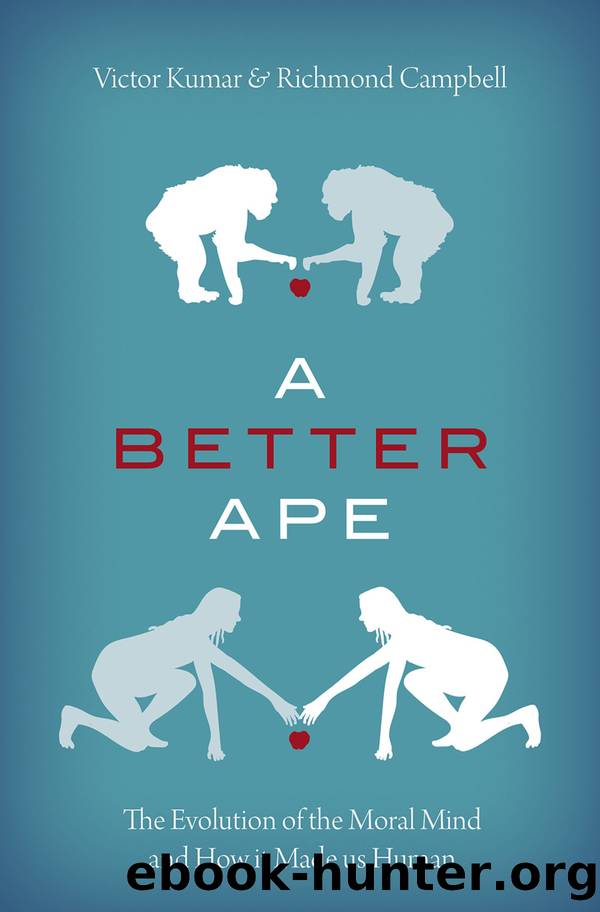A Better Ape by Victor Kumar and Richmond Campbell

Author:Victor Kumar and Richmond Campbell
Language: eng
Format: epub
Publisher: Oxford University Press
Published: 2022-04-15T00:00:00+00:00
IV
Moral Progress
8
Progress
For most of human history, our ancestors lived in small bands that were nomadic and relatively egalitarian. As their thinking and behavior evolved to become recognizably modern, however, human social organization changed dramatically. Institutions linked small bands together into large tribes. Tribes enhanced social complexity by creating a superstructure of relationships beyond the immediate family and local community.
Institutions also created further divisions of labor and knowledge. An expansion of inherited institutional culture allowed some humans to become specialized for roles within extended families, armed militias, and bodies of regional political governance; within sophisticated economies of hunting and gathering, farming and herding. After the rise of agriculture and urbanization, furthermore, humans charted a return trip to pervasive social hierarchy, familiar across great ape species.
In the earliest large-scale agricultural societies, a surplus of food and other resources enabled social systems in which some individuals could gain status and authority over others. The ruling classes occupied elevated social roles that were only remotely connected to food production or childrearing. Social rank and influence were unequally distributed. Thus, beyond new divisions of labor and knowledge, humans acquired further divisions of status and powerâbetween the sexes and within them.
Agriculture was the first major technological revolution to impact modern humans. The seeds were planted some 12,000 years ago, but significant growth did not ensue for another 6,000 years, after the urban revolution and the consequent spread of agricultural city-states. Other technological revolutions are of more recent vintage, the offspring of learning institutions. In the 18th century, the industrial revolution was launched. Machines were used to manufacture goods, powered by steam and fossil fuels rather than humans or animals. In the 20th century, the world began to be transformed by a sweeping revolution in information technology.
In each modern technological revolution, humans outsourced laborâfirst to plants and animals, then to biologically inert machines and materials, and finally to computers and networks that mimicked and surpassed some of the functions of human brains. Efficient modes of production and a consequent surplus of resources led, in each case, to greater social complexity. More individuals were linked together in vast cooperative schemes. A profusion of specialized roles meant additional divisions of work and expertise. And all of this social coordination was managed by deepening and ever more pervasive social hierarchies. Powerful city-states dominated neighboring tribes and villages, evolving into nation-states and empires. As urban and rural societies were linked together in expanding economies of scale, relationships between management and labor acquired deeper asymmetries in power.
The human story began with small bands and continued with the evolution of large tribes and even larger societies. It has ended (for now) with technological revolutions in science and industry, alongside social revolutions in political and economic organization. There is no doubt that human societies have become more and more complex over the last few thousand years, especially over the last few hundred years. But have things gotten any better? Morality has evolved, but have humans become morally evolved?
Part III of this book was occupied with the evolution of institutional moralities during early modernity.
Download
This site does not store any files on its server. We only index and link to content provided by other sites. Please contact the content providers to delete copyright contents if any and email us, we'll remove relevant links or contents immediately.
Cecilia; Or, Memoirs of an Heiress — Volume 1 by Fanny Burney(32558)
The Great Music City by Andrea Baker(32020)
Cecilia; Or, Memoirs of an Heiress — Volume 2 by Fanny Burney(31956)
Cecilia; Or, Memoirs of an Heiress — Volume 3 by Fanny Burney(31942)
We're Going to Need More Wine by Gabrielle Union(19049)
All the Missing Girls by Megan Miranda(16032)
Pimp by Iceberg Slim(14509)
For the Love of Europe by Rick Steves(14124)
Bombshells: Glamour Girls of a Lifetime by Sullivan Steve(14077)
Talking to Strangers by Malcolm Gladwell(13371)
Norse Mythology by Gaiman Neil(13370)
Fifty Shades Freed by E L James(13243)
Mindhunter: Inside the FBI's Elite Serial Crime Unit by John E. Douglas & Mark Olshaker(9344)
Crazy Rich Asians by Kevin Kwan(9293)
The Lost Art of Listening by Michael P. Nichols(7506)
Enlightenment Now: The Case for Reason, Science, Humanism, and Progress by Steven Pinker(7314)
The Four Agreements by Don Miguel Ruiz(6765)
Bad Blood by John Carreyrou(6623)
Weapons of Math Destruction by Cathy O'Neil(6281)
